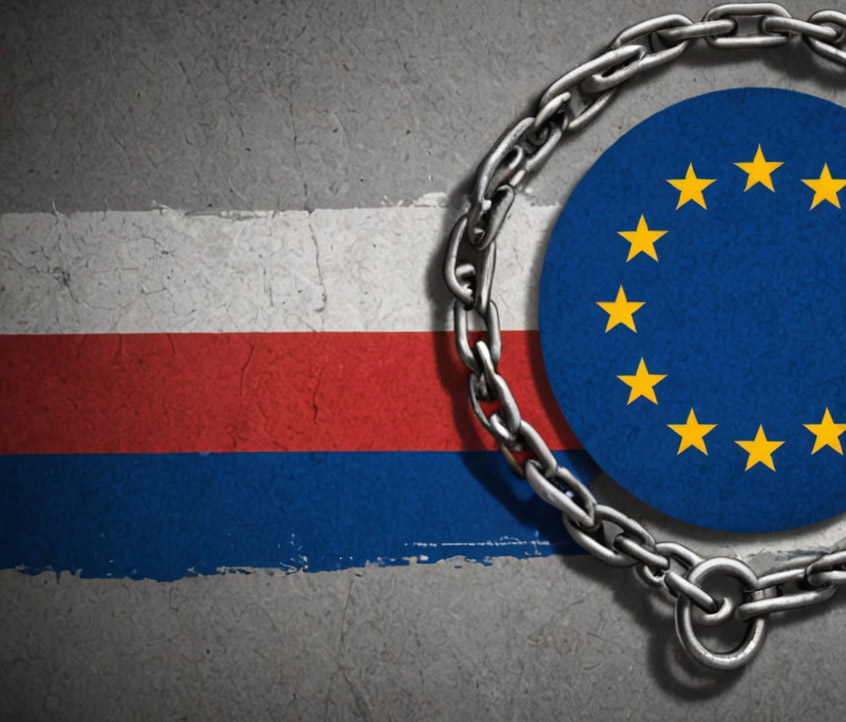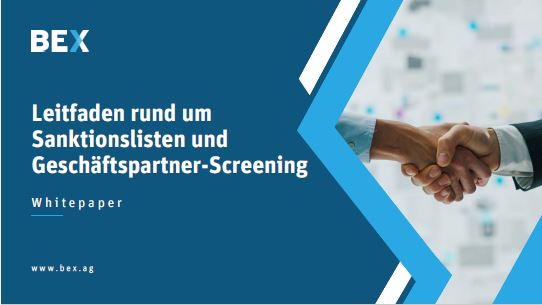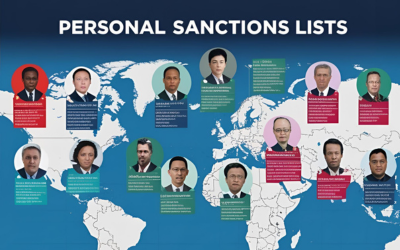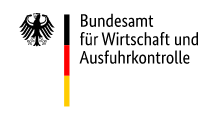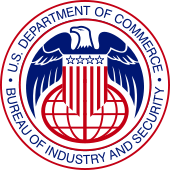What is a sanctions list?
When it comes to financial transactions and the movement of goods, it is essential for European companies to check so-called sanctions lists. This is because there are a number of restrictive measures in place for the persons, organizations and goods listed in sanctions lists. The lists can restrict foreign trade, ban the export of certain goods or prohibit all business relationships, including domestic ones. Anyone who does not want to violate these sanctions must carry out a corresponding compliance screening. But what exactly are sanctions lists? Who is responsible for them and where can you find them? We answer the most important questions on this topic.

Lists of personal, organizational and goods-related sanctions
A sanctions list is a publicly accessible list of persons, associations or companies against whom economic and / or legal restrictions have been imposed by states or communities of states as part of sanctions. In some cases, the lists of goods are also included in the sanctions lists, which in turn prohibit the supply of certain goods to the listed persons and/or states. In addition to persons, goods are also sometimes the focus of sanctions.
Differentiation from the term “embargo”
The term “embargo” is often used when talking about sanctions. In fact, the two terms are related: Embargoes are a special form of sanctions that restrict international trade. They affect specific groups of goods or entire countries. In contrast to embargoes, sanctions can be of a diplomatic nature, for example.
One example is the arms embargo. It restricts or prohibits the export of armaments. In some cases, it also imposes stricter export restrictions on goods that can be used indirectly for military purposes (dual use).
Example: Sanctions and sanctions lists against Russia
In response to the annexation of Crimea and Russia’s war of aggression against Ukraine, the EU imposed sanctions against Russian individuals, groups and organizations in Russia. However, third countries such as Belarus have also been subject to restrictive measures due to their cooperation in the Russian invasion. The Russia sanctions include, for example
- the freezing of any assets of Russian individuals, groups or organizations in EU banks
- a freeze on all transactions between EU banks and the Russian central bank
- a ban on the entry of sanctioned persons into the EU
- an export ban on armaments and dual-use goods (physical goods and technologies with a dual use)
- an export ban on luxury goods, critical goods for the aerospace industry and other goods and technologies
- restrictions on media professionals and institutions that disseminate Russian propaganda
The EU’s sanctions decisions are intended to ensure that Russia is provided with fewer opportunities and resources to help the country continue its invasion of Ukraine.
Our guide to Russia sanctions (only available in german) provides a comprehensive overview of current regulations and sanctions lists.
Who imposes sanctions on individuals, associations and companies?
Sanctions usually have a political background and are in most cases imposed by governments, alliances or organizations. These can be the United Nations, for example, whose sanctions lists are applied in many countries around the world. In addition to UN sanctions, there are also EU sanctions. As part of its Common Foreign and Security Policy (CFSP), the European Union also draws up its own list of sanctioned persons, organizations and states.
For Germany and Austria, the EU publishes the consolidated list EU_CFSP (Common Foreign & Security Policy) online. The SECO list applies to Switzerland.
Why are goods, people and organizations sanctioned?
Sanctions are often used as a reprisal against a third country, certain individuals, organizations and institutions that have violated human rights and international law, for example. However, trade restrictions can also be imposed for the protection of plant and animal species and cultural assets. Sanctions lists therefore often include measures to combat terrorism and to support human rights or environmental protection.
This is also illustrated by a look at the history of EU sanctions: It began with the examination of persons suspected of terrorism in response to the terrorist attacks of September 11, 2001. The legal basis for this EU-created list of sanctioned persons is the regulations:
- (EU) Nr. 2580/2001 (Anti-Terrorism)
- (EU) Nr. 881/2002 (Al-Quaida)
- (EU) Nr. 553/2007 (Al-Quaida) – Changes to 881/2002
- (EU) Nr. 753/2011 (Taliban)
- (EU) Nr. 2019/796 against cyber attacks
There are also other general or country-specific EU embargo regulations, which list persons and organizations subject to restrictions in the annexes. Export restrictions on certain goods are currently in place specifically against entities in Iran, North Korea, South Sudan, Russia and Ukraine.
What happens when sanctions are circumvented?
It is not only for humanitarian reasons that the sanctions list check is so important for companies: according to Section 4 (2) of the German Foreign Trade and Payments Act (AWG), the obligations to act resulting from the decisions of the Council of the European Union must be implemented. Violations can result in up to 10 years imprisonment and severe fines for managing directors and export managers.
Free e-book for checking sanctions lists
As a company, how do you check your business partners against the list of sanctioned persons and organizations? The free e-book on sanctions list checks helps you to stay safe when doing business with other countries. Acquire basic knowledge about sanctions lists and learn how to use them to only do business with the right people or companies. We explain everything you need to know – easily, comprehensibly and with practical examples.
You can find the e-book at (only in german available): https://www.bex.ag/en/e-book-sanctioned-party-list-screening/
Who are sanctions lists applicable to?
Is there an EU obligation to check sanctions lists?

In principle, all companies and individuals must ensure that financial sanctions are not violated. Most do this by checking sanctions lists before entering into business with other partners. This applies to large companies as well as small businesses, self-employed persons and private individuals who, for example, want to rent out an apartment or sell a car.
Even if your company only does business within Germany, the following applies: Management must ensure, as part of their duty of care, that no business is initiated with a person subject to financial sanctions. In this case, this contact may not receive any economic resources or financial support. Failure to comply can be punished with fines and imprisonment.
There is no corporate criminal law in Germany, so violations of export control law are usually attributed to the responsible natural persons. This means that the managers and, if applicable, the designated export manager are personally liable for violations.
The management is responsible for compliance with export control regulations and can be prosecuted under criminal or administrative law in the event of violations. If an export manager has been designated to the Federal Office of Economics and Export Control (BAFA), they are also personally liable.
Checking US lists also recommended for:
Regardless of the nationality of specific business contacts, all companies should consider the issue of sanctions lists worldwide. This is because it is not only the list of sanctioned persons, organisations or goods compiled by the EU that must be taken into account. Domestic companies also face specific economic risks, particularly in connection with the US lists.
Even if the US has no direct legal authority in the EU, US law provides for extraterritorial export controls, e.g. in the form of ‘secondary sanctions’. It is therefore advisable to also observe relevant US lists such as the SDN list (also known as the OFAC list).
Compliance with US sanctions regulations and the SDN list is particularly important if:
- Transactions are conducted in US dollars
- US financial institutions are involved
- Business relationships with US markets exist or are planned
How often must sanctions lists be checked?
There is no binding statement as to how often and in what way checks must be carried out. An economically and technically justifiable effort must be made to prevent the persons and organizations named on sanctions lists from receiving goods, services or financial support. In the event of a dispute, a judge will decide whether this was sufficient. Most companies check according to the following frequency:
- min. Once a month all addresses – address master check
- ongoing when creating or changing address – online check
- ongoing when purely using the address, e.g. for an offer – document check
TIP If an entry cannot be found, it is important to be able to prove with a test report that it has been checked in principle.
How can a sanctions list check be carried out effectively?
How do you know which business contacts belong to the lists of sanctioned organizations and individuals, for example? In order to ensure that no business is conducted with persons or companies that are on sanctions lists, sanctions list checks must be carried out regularly. There are various ways to do this. One of these is a manual search on the websites of the sanctions list authorities – such as the Federal Ministry of Economics and Export Control (BAFA). Here you can find the current sanctions lists for individuals and organizations.
Another option is an automated search using special software solutions such as SANSCREEN. These programs automatically search the sanctions lists and compare the names with the business partners. This allows countries, individuals and organizations to be checked quickly and easily.
Instructions for checking the sanctions list
With the help of suitable software – such as SANSCREEN – the sanctions list check can be easily integrated into your business processes. The tool regularly checks existing and new business contacts for matches with the various sanctions lists. In the event of a match, further steps must then be initiated, which vary depending on the type of list. For example, companies may be subject to licensing requirements or even entire import or export bans.
Would you like to know how the determination of sanctions list matches works in detail? Learn how to successfully check your business partners and even view sanctions lists free of charge – with our practical step-by-step guide.
How can sanctions lists be accessed?
There are various ways to access sanctions lists. One option is to search for the various sanctions lists on the internet. There are many websites that provide such information. However, it is important to ensure that the information on such websites is up to date and reliable. Another way to access sanctions lists is to use software or tools that have been developed specifically for this purpose. Such tools can help companies and organisations quickly and easily check whether their business partners are on sanctions lists.
It is important to emphasise that sanctions list screening is of great importance for companies and organisations. Screening can help prevent illegal business practices and minimise the risk of legal disputes and penalties.
Which sanctions lists need to be checked?
 Below you will find an overview of all currently relevant sanctions lists and the corresponding explanation of when which list must be checked.
Below you will find an overview of all currently relevant sanctions lists and the corresponding explanation of when which list must be checked.
You can also read about the consequences of a hit in the sanctions lists.
What sanctions lists are there? Where can I find the correct sanctions list?
EU_CFSP - Consolidated list of persons
Consolidated list of persons, groups and entities subject to EU financial sanctions, Publisher: European Union External Action: Common Foreign and Security Policy.
EU-RUSK - Russia embargo on the capital market
Russia embargo on the capital market, publisher: European Commission / Council of the European Commission
GB_HMT - Consolidated list of Financial Sanctions Targets in the UK
JP_METI - End User List
US_DPL - Denied Persons List
Denied Persons List, Publisher: Bureau of Industry and Security, U.S. Department of Commerce
US_UL - Unverified List
Unverified List, Herausgeber: Bureau of Industry and Security, U.S. Department of Commerce
US_LADP - List of Administratively Debarred Parties
US_NONSDN- Consolidated Sanctions List
EU_RUSD - Russia embargo on dual-use goods
Russia embargo on dual-use goods, publisher: European Commission / Council of the European Commission
EU_IRAN - Iran Embargo
CH_SECO - Consolidated List
Consolidated List, publisher: State Secretariat for Economic Affairs SECO
US_SDN - Specially Designated Nationals And Blocked Persons List
US_EL - Entity List
Entity List, Publisher: Bureau of Industry and Security, U.S. Department of Commerce
US_LSDP - List of Statutorily Debarred Parties
US_NPL- Nonproliferation List
Nonproliferation List, Publisher: U.S. Department of State, Bureau of International Security and Nonproliferation
EU Lists
EU_CFSP – Consolidated list of persons, groups and entities subject to EU financial sanctions (EU sanctions list)
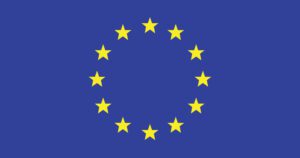
Sanctions are implemented in the form of EU regulations that apply to all EU countries. Many of these regulations are based on decisions of the United Nations Security Council, such as the measures against Russia, North Korea, Syria or Libya. The consolidated sanctions list European Union (EEAS) – Common Foreign & Security Policy (CFSP) is available in XML format under this Link available for download. This address collection contains all people, organizations and associations against which the EU has financial sanctions. All EU-wide lists of names that are published in the course of regulations in the European Official Journal can be found in this consolidated collection of lists. The entries are therefore made with different backgrounds on the fight against terrorism, the implementation of country embargoes, the fight against torture and political and economic sanctions.
Regulation (EU) 2019/796 against cyber attacks
In order to create a secure cyber space, the EU imposed sanctions against cyber terrorism in May 2019. In our article “New regulation against cyberattacks” we regularly publish updates and summarize the essential points You together.
What needs to be taken into account when a hit occurs?
Companies and individuals on this list are subject to financial sanctions, therefore no economic resources and funds may be made available and the affected person’s assets will be frozen. In exceptional cases, permits can be applied for. In Germany, the responsible authority for approving the supply of economic resources is the Federal Office of Economics and Export Control (BAFA) and for financial resources is the Deutsche Bundesbank.
EU_RUSD – Russia Embargo: Dual-use goods
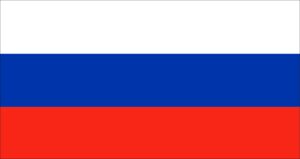
Regulation (EU) No. 960/2014 newly introduced the ban on the sale, delivery, transfer or export of goods listed in Annex I of the EC Dual-use Regulation to the mixed recipients listed in Annex IV of this regulation (Art .2a). This also applies to technical assistance or financial services that are related to dual-use goods. Excluded from this ban are contracts concluded before September 12, 2014 or if the goods are intended for the preservation and security of existing civil nuclear capacities in the EU or are delivered to non-military end users in the aerospace sector.
What needs to be taken into account when a hit occurs?
Activities related to dual-use goods are prohibited.
EU_RUSK – Russia Embargo: Capital Market
According to Regulation (EU) 833/2014 Article 5 and the new version with Regulation (EU) No. 960/2014, the following prohibitions apply:
- Purchase and sale of securities and money market instruments with a maturity of more than 90 days issued by an entity listed in Annex III to the Regulation by September 12, 2014.
- Purchase and sale of securities and money market instruments with a maturity of more than 30 days issued after September 12, 2014 by an entity specified in Annexes III, V and VI of the Regulation.
- Re-issuance of loans or credits with a term of more than 30 days to the entities listed in Annexes III, IV and VI to the Regulation, unless these are intended to fulfill the financing of permitted imports and exports between the EU and Russia.
What needs to be taken into account when a hit occurs?
The bans only apply to financing instruments with a term of more than 30 days. For terms of more than 30 days, the above prohibitions apply.
According to Regulation (EU) 2022/345 Article 5h of March 1, 2022, the following ban applies from March 12, 2022:
- Use of specialized payment messaging services used for the exchange of financial data for the legal persons, organizations or bodies listed in Annex XIV or for legal persons, organizations or bodies established in Russia whose ownership rights exceed 50% % lie directly or indirectly with an organization listed in Annex XIV.
Also prohibited since 2025:
- Use of the Russian SPFS system (Art. 5n)
- Transactions with Sberbank Europe AG
Furthermore, prohibited with reference to Russian financial institutions:
- IT consulting
- Legal advice
EU_IRAN – Iran Embargo
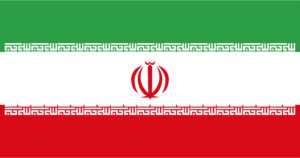 The sanctions list Iran no longer plays a major role after the agreed easing as part of the nuclear deal, but the sanctions have not been completely lifted. The lists of people have been minimized, but are still there. It should be noted that when the Iran sanctions were added, the consolidated EU list was expanded with a delay. In some cases, no business may be conducted with the people listed. Some entries only have a ban on the delivery of dual-use goods or investment restrictions at certain banks. This must be checked in the Embargo Regulation. When doing business with Iran, checking against the US lists is also strongly recommended, as the US government’s sanctions against Iran have been extended and even expanded. We make this recommendation because almost every German company is economically dependent on the USA.
The sanctions list Iran no longer plays a major role after the agreed easing as part of the nuclear deal, but the sanctions have not been completely lifted. The lists of people have been minimized, but are still there. It should be noted that when the Iran sanctions were added, the consolidated EU list was expanded with a delay. In some cases, no business may be conducted with the people listed. Some entries only have a ban on the delivery of dual-use goods or investment restrictions at certain banks. This must be checked in the Embargo Regulation. When doing business with Iran, checking against the US lists is also strongly recommended, as the US government’s sanctions against Iran have been extended and even expanded. We make this recommendation because almost every German company is economically dependent on the USA.
What needs to be taken into account when a hit occurs?
In some cases, no business may be conducted with the people listed. Some entries only have a ban on the delivery of dual-use goods or investment restrictions at certain banks. This must be checked in the embargo regulation.
JP_METI – End User List
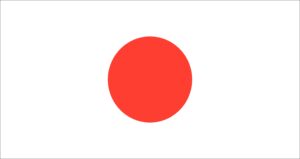 The METI List is published by the Japanese Ministry of Economy, Trade and Industry. The list includes companies and organizations suspected of developing weapons of mass destruction or missiles or associated with terrorism.
The METI List is published by the Japanese Ministry of Economy, Trade and Industry. The list includes companies and organizations suspected of developing weapons of mass destruction or missiles or associated with terrorism.
What needs to be taken into account when a hit occurs?
Licensing requirements apply to goods intended for the development or production of weapons of mass destruction. Shipments to listed companies or organizations must be approved by METI.
GB_HMT – Consolidated list of Financial Sanctions Targets in the UK
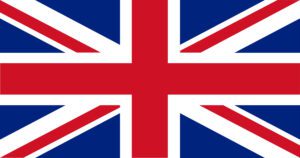 The former Bank of England list is managed by HM Treasury, the UK’s finance ministry. HM Treasury publishes this list to combat money laundering and prevent terrorist financing. This list contains financial sanctions decided by the EU and national additions by Great Britain. Since the European financial sanctions are included in the EU_CFSP list, this list is expanded to include the national additions.
The former Bank of England list is managed by HM Treasury, the UK’s finance ministry. HM Treasury publishes this list to combat money laundering and prevent terrorist financing. This list contains financial sanctions decided by the EU and national additions by Great Britain. Since the European financial sanctions are included in the EU_CFSP list, this list is expanded to include the national additions.
What needs to be taken into account when a hit occurs?
A: Company based in UK jurisdiction: You should report the hit to HM Treasury. It is decided there whether the goods/services or money can be passed on to the recipient. B: Company headquarters in the legal area of the EU Since European law is implemented on the sanctions list, the consequence, as with the EU list, is that no economic resources or finances may initially be transmitted. For national additions that are not also on the EU list, coordination with HM Treasury may make sense.
CH_SECO – Consolidated List
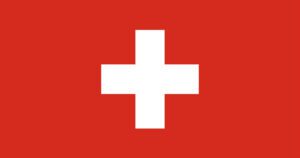
The Swiss State Secretariat for Economic Affairs (French: Secrétariat d’État à l’économie – SECO) provides the Swiss sanctions list. The measures were adopted to enforce sanctions decided by the Organization for Security and Cooperation in Europe or by Switzerland’s main trading partners. The legal basis for this is the Embargo Act (EmbG). The SECO list should be checked by companies that are subject to Swiss law or have commercial relationships with Switzerland.
What needs to be taken into account when a hit occurs?
A: Company headquarters in the legal area of Switzerland: Who benefits from measures under the Swiss Embargo Act (EmbG, https: //www.admin.ch/opc/de/classified-compilation/20000358/index.html) is directly or indirectly affected must provide the Swiss State Secretariat for Economic Affairs with the information and submit the documents necessary for a comprehensive Assessment or control is required. B: Company headquarters in the legal area of the EU: Since SECO is participating in the European sanctions, no economic resources or finances should initially be transferred here. For national additions that are not also on the EU list, coordination with the Swiss State Secretariat for Economic Affairs should take place.
US lists
Which US lists are relevant for me?
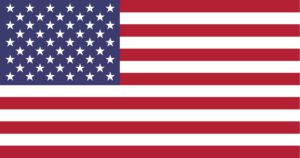 The US authorities now provide many different address lists, which companies must check before initiating business. Various programs have been issued, which can be found in the so-called OFAC list collection (see below). Important difference to the EU list: Not every hit in a US list automatically leads to a ban. Sometimes just a permit is needed. Essentially, countries outside the USA must also pay attention to the following lists, as these must be taken into account from the perspective of US authorities worldwide – especially by European companies.
The US authorities now provide many different address lists, which companies must check before initiating business. Various programs have been issued, which can be found in the so-called OFAC list collection (see below). Important difference to the EU list: Not every hit in a US list automatically leads to a ban. Sometimes just a permit is needed. Essentially, countries outside the USA must also pay attention to the following lists, as these must be taken into account from the perspective of US authorities worldwide – especially by European companies.
US_SDN – Specially Designated Nationals And Blocked Persons List
Here you can find natural or legal persons who are involved in activities that endanger the security of the USA. Unfortunately, German entrepreneur Ulrich Wippermann also had to suffer this learned when his company was targeted by the American authorities. He was not guilty of anything under German law.
What needs to be taken into account when a hit occurs?
If a hit occurs here, this trading partner must apply for approval from the American authorities for the exchange of goods that are subject to the Export Administration Regulations (EAR). This applies to US persons and worldwide to all entries with the following designations: NPWMD, SDGT, SDT, FTO, IRAQ2, BURMA.
US_DPL – Denied Persons List
The consequences of this list are harsher. Natural and legal persons who have violated US export law are listed here. The Bureau of Industry and Security (BIS) has issued a denial order against these individuals. These people are subject to a comprehensive ban on trading in US products.
What needs to be taken into account when a hit occurs?
Companies that violate this ban are violating U.S. export rules. This can lead to penalties and you can also be listed on the DPL yourself. Therefore, do not do business with people listed there.
US_EL – Entity List
People who pose a risk of being involved in the proliferation of weapons of mass destruction are listed here.
What needs to be taken into account when a hit occurs?
The list entry found indicates what ban exists and what authorization is required to make US products available to that person. It should be noted that EAR99 goods are often not subject to approval.
US_UL – Unverified List
People can be included on this list if there is any doubt as to whether they are suitable for purchasing US products. It is a kind of warning list.
What needs to be taken into account when a hit occurs?
It must be ensured that the goods are not used for a prohibited end use.
US_LSDP – List of Statutorily Debarred Parties
This is preceded by a violation and a conviction under the arms export control law for the natural or legal person.
What needs to be taken into account when a hit occurs?
The listed persons are excluded from trading in US defense equipment.
US_LADP – List of Administratively Debarred Parties
The Assistant Secretary of State for Political-Military Affairs may exclude certain persons or organizations from trading in military equipment.
What needs to be taken into account when a hit occurs?
The listed persons are excluded from trading in US defense equipment.
US_NPL – Nonproliferation List
The Bureau of International Security and Nonproliferation is responsible for compliance with various nonproliferation programs of materials, technologies and expertise in the field of nuclear, biological, chemical or radiological weapons of mass destruction and their delivery technology. Nonproliferation is implemented in various programs*, which are different Provide for sanctions against individuals and governments.
What needs to be taken into account when a hit occurs?
If you get a hit, you need to determine which program is sanctioning the person or government. You can determine this using the sanctions list. Depending on the program, you will need to check whether your activity is covered by the sanctions and, if so, apply for approval from the relevant department. *Programs: Executive Order 13382 Executive Order 12938 Missile Sanctions laws Iran, North Korea, Syria Nonproliferation Act Sanctions Iran Nonproliferation Act of 2000 Chemical and Biological Weapons Control and Warfare Elimination Act Nuclear Proliferation Prevention Act Export-Import Bank Act Iran and Syria Nonproliferation Act Transfer of Lethal Military Equipment Iran-Iraq Arms Nonproliferation Act of 1992 Section 231 of CAATSA
US-NONSDN – Consolidated Sanctions List
To facilitate compliance with the Office of Foreign Assets Control (OFAC) sanctions regulations, there is a consolidated list of all non-SDN sanctions lists. The consolidated list includes:
- Foreign Sanctions Evaders ( FSE) List,
- Sectoral Sanctions Identifications ( SSI) List,
- Palestinian Legislative Council ( NS-PLC) list,
- The List of Foreign Financial Institutions Subject to Part 561 (the Part 561 List),
- Non-SDN Iranian Sanctions Act (NS-ISA) List and
- List of Persons Identified as Blocked Solely Pursuant to Executive Order 13599 (the 13599 List).
Although the included lists are not part of the SDN list, the entries can be included in both lists.
What needs to be taken into account when a hit occurs?
If you get a hit, you must determine which of the above lists the corresponding entry is on and whether your activity is covered by the sanctions. If this is the case, you will need permission from OFAC.


